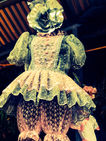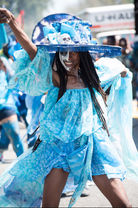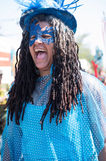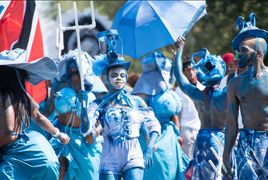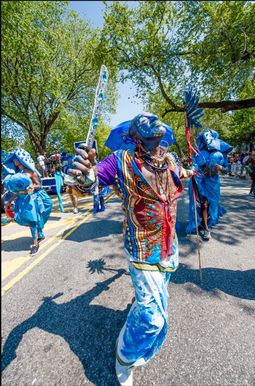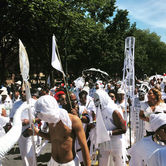BELMONT BABY DOLLS: "SPIRIT DOLLS"
Trinidad Carnival, Port of Spain
24-25 February 2020

In collaboration with Brianna McCarthy
Trinidad Carnival, Port of Spain
Performed by Makeda and Nyah Love Thomas, Lyndon Gill, Mari Pitkänen, Angelique Nixon, Arnaldo James, Jamie Philbert, Jade Drakes, Shay Alexander, Isabel Dennis, Cecile Pemberton and Eva Thomas, Patriann Edwards, Arielle John, and Kwayera Cunningham-Archer.
“Spirit Dolls” sets its foundation on the traditional elements of the Baby Doll Mas. Materials are a mix of African textiles, European lace, and fabrics commonly found in Caribbean homes - florals and cotton prints. In this way, we are interested in a “Caribbean” Doll, with all those respective cultural influences, and moving towards something that is unique; self-defined. And while the aesthetic is strong, this mas is less about what a Baby Doll looks like, and more about what Baby Doll mas can do. Spirit dolls act as vessels for beings of powerful spirits. In this performance, Carnival is the ritual to invoke the spirit of the Doll; to open a path to the impossible.
"When Dolls Dance" in "Black Dance: My Voice, My Practice".
READ The Art of Rebellion: The Baby Doll Masquerade in Trinidad and Tobago’s Carnival. Smithsonian Folklife Magazine.
SEE "Baby Doll Mas' Old & New Interpretations at “The Old Yard” at the University of the West Indies, Centre for Creative & Festival Arts
Photography by Abigail Hadeed.
BELMONT BABY DOLLS: "CARNIVAL BABY"
Trinidad Carnival, Port of Spain
4-5 March 2019
In collaboration with Shannon Lewis
Trinidad & Tobago Carnival - Port of Spain
with Makeda and Nyah Love Thomas, Jade Drakes, Arnaldo James, Olubusola Chung, Shanya Springer, Sophie Bufton, Adeline Gregoire, Amanda McIntyre, Jarula Wegner, and Shannon Lewis.
“Carnival Baby” - eleven MASterful performers whose work “traces the roots of this Mas as one in which women assert control over their sexuality, their womanhood, their motherhood; to assert their “performative identities” against interpretations that would deny both their agency and their pleasure”. (Vaz-Deville). Belmont Baby Dolls extend this ethos throughout their lives and engage this embodied practice as a way to examine how gender and race have shaped and continue to shape this ritual, explore sexuality in the lives of Caribbean girls and transgressive sexuality performed publicly by women, and the way the tradition helps to revitalize spirits. We are the dolls, their mothers, their sisters, their aunts, their lovers...
READ "The Return of the Baby Doll" in Caribbean Beat
Photos by Arnoldo James

NEW WAVES! MAS:
"BLUE BLUE"
Brooklyn, New York
3 September 2018
In collaboration with Tracey Sankar-Charleau. Presented in partnership with Pagwah Mas, CaribBeing, and Dance Caribbean Collective.
BLUE BLUE...GOD LOVES YOU. Invoking the spirit and cultural significance of the color blue - blue blue, blue devil blue, blue soap blue. New Waves! MAS - “the dancer’s band” - presents “BLUE BLUE” - a Processional Performance for the 2018 West Indian American Day Carnival.
...a performative force of African diasporic spiritualities, colonial histories, and contemporary aesthetics…
…a hue-ristic method: an embodied, fluid way of knowing through color, movement, and collective memory…
…a pathway to knowledge, a shimmering threshold between sensation and cognition. Blue hues the world in gradients of affect…
Photography by Gerald Horton.

NEW WAVES! MAS:
"WHITEWASH"
Brooklyn, New York
4 September 2017
In collaboration with Brianna McCarthy, Robert Young, Tracey Sankar, Sonja Dumas, Keomi Serrette, and Gregory Young. Presented in partnership with Pagwah Mas. *3rd Place Winner - Adult Band (sm)
“Whitewash” (2017) a collaboration with six Trinidad-based artists - Brianna McCarthy (“Memento M - As dust and bone”), Robert Young (“The Caribbean Between the Devil and the Deep Blue Sea”), “Erzulie: La Diablesse” by Tracey Sankar, “Water Woman” by Sonja Dumas, “Obatalá” by Gregory Young", and Keomi Serrette for "Jouvay Ayiti".
"How does Carnival define Caribbean diasporic movement? What is the relationship between Carnival and diasporic identities? How are politics of emancipation and practices of resistance expressed through Carnival? This mas is a meditation on how we in the Diaspora connect to and continue to breathe life in to our inheritance - our culture, our people, our collective futures. It is a consideration of how dance artists can contribute to that future while building community. The West Indian American Day Carnival has been a cultural lifeline for many Caribbean people living not just in New York, but in the entire United States. There are many things that have changed about the Carnival since I played mas here as a young person. What hasn’t changed is that the Carnival is still truly organized by the community and there is space for artistic, critical engagement as it relates to and within its context. ”




































